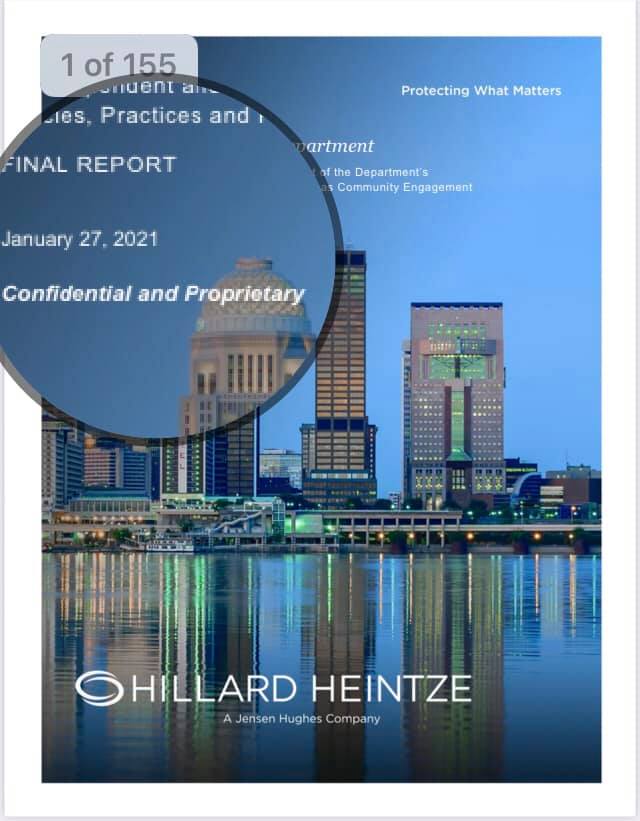
A word to the wise: Never designate as "Confidential and Proprietary" a $190,000 publicly funded audit of a police department plagued by public mistrust that is born — in part — of secrecy and defiance of the open records law.
file:///var/mobile/Library/SMS/Attachments/c6/06/B331BFFD-B3F7-4EF6-8C99-FD06D07F6C2C/hillard-heintze-report.pdf
This "Confidential and Proprietary" designation appears on every page of the 155 page audit of the Louisville Metro Police Department prepared by Hillard Heintze and released by Louisville Metro Government on January 28. It appears in the final paragraph of the January 27 transmittal letter from Hillard Heintze Senior Vice President Robert L. David to Louisville Mayor Greg Fischer in the statement, "This is a confidential and proprietary work document between Hillard Heintze and the Louisville-Jefferson County Metro Government." It even appears on the cover page of the audit, entitled "An Independent and Objective Assessment of the Department's Policies, Practices, and Procedures, as well as Community Engagement."
And, in the upper righthand corner of that cover page, this phrase appears: "Protecting What Matters."
Apparently, the "public's right to know" does not matter.
While Louisville officials and Hillard representatives acknowledged the importance of transparency several times during the January 28 press conference announcing the release of the report, there is not a single reference to the open records law — which has secured transparency in the Commonwealth for 45 years — anywhere in the 155 page report.
Nor did anyone have the good sense to remove the "Confidential and Proprietary" designation from the report before it was released, even though the designation had no legal or practical effect whatsoever.
https://ag.ky.gov/Priorities/Government-Transparency/orom/2010/10ORD110…
LMPD's failure to adhere to the open records law is well known and widely documented. It has come at a high cost in public funds, public resources, and — most importantly — public confidence, but the law enforcement agency's non-compliance with the law merits no attention in the report.
Apparently, that pattern of willful noncompliance -- manifested in delayed or denied public access to body cam video, applications for search warrants, "missing" Explorer Scout program investigative records, internal affairs reports addressing police misconduct, and records documenting police response to demonstrations and protests -- does not "matter."
The report contains no recommendation that LMPD cease slow walking open records requests, and production of responsive records, until those records are de-valued. It contains no recommendation that LMPD cease treating all, or nearly all, records in an open investigative file as exempt from public inspection based on boilerplate excuses and a stubborn disregard for controlling caselaw. It contains no recommendation that LMPD cease forcing requesters to appeal to the attorney general or the courts to pry public records loose.
It offers no recommendations —concrete or otherwise — for change aimed at eliminating LMPD's notorious culture of secrecy and reprioritizing the public's right to know.
To its credit, Louisville Metro recognized that the open records law required the release of the Hillard Heintze final report. It did so one day after it was transmitted, thus avoiding another open records battle that would have ended in defeat.
But neither the events of 2020 nor the LMPD audit suggest that a change in that culture of secrecy is imminent. Just this week, attorney Sam Aguiar filed another lawsuit alleging violation of the open records law by LMPD.
It is a glaring omission.
Or is it?
It may be that -- when all is said and done -â restoration of public trust in LMPD transparency is not contingent on a consultant's recommendation that the department remediate past illegal open records practices. The law itself provides the "roadmap to a new policing environment."
Noncompliance with the law has landed the agency in the courts on multiple occasions.
The question is: Can LMPD rise to the challenge of simply complying with the spirit and letter of the law.
Compliance with the open records law, and recognition of the public's right to know, are certainly "matters" worthy of "protecting."


